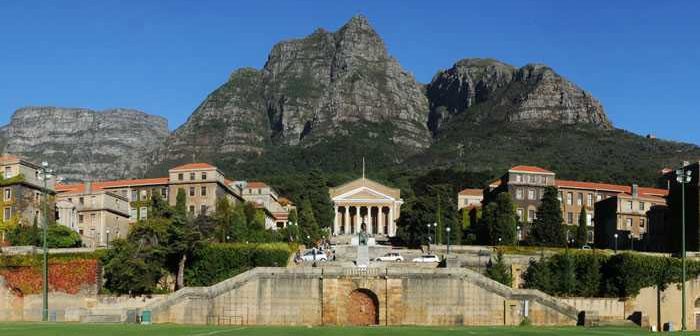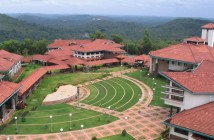The Graduate School of Business (GSB) at the University of Cape Town in South Africa offers MBA both in a modular and full-time format. Listed in the Financial Times Top 100 Global MBA ranking, the GSB Masters in Business Administration (MBA) curriculum is international in scope and standards but with a distinctive orientation to the (South) African context.
It has a strong practical emphasis and, in addition to addressing the functional areas of business, new streams of learning around communication, leadership and entrepreneurship keep it at the cutting edge of professional development.
The modular format is for professionals who will be able to study while carrying on with their work. It involves six full-time, two-week modules spread over two years. Participants need to be absent from their workplace only for a total of 13 weeks during this time frame. The core courses are covered in the first four modules and the electives in the final two. Altogether, it requires 502 hours of contact time.
Less contact time is made up for in the inter-modular period by prescribed readings and assignments. Learning support is provided between modules to ensure continuity and accommodate the off-site learning process. Written examinations usually occur outside the prescribed module dates, on either Saturdays or Sundays, at designated locations.
In South Africa, the exam centers are at Cape Town, Johannesburg, Durban, Port Elizabeth, East London, Bloemfontein and Kimberley. In rest of Africa and SADC, the centers are at Windhoek (Namibia), Maputo(Mozambique), Harare (Zimbabwe),
Nairobi (Kenya), Lagos (Nigeria), Kinshasa (DRC), Blantyre (Malawi), Port Louis (Mauritius) and Gabarone (Botswana). London is also in the list.
Full-time MBA
The full-time MBA spreads over 11 months with 602 hours of contact time. The final exams are held at the University of Cape Town.
The electronic-learning platform, Instructor, is used extensively for delivery of reading material and for feedback for both the full-time and modular classes. Additional learning support for modular students is given by the MBA director, faculty and a dedicated Learning Support Coordinator.
With students expected to continue working in their groups during the inter-modular period, reliable internet access is essential.
Eligibility
The applicants are expected to be 25 years or older with a minimum of three years work experience. They must be fluent in English. Applicants whose mother tongue is not English will be required to produce a TOEFL certificate. The candidates should have completed either a Bachelor Honours degree or Postgraduate Diploma or a cognate Bachelor’s Degree equivalent at level 8 through relevant work experience.
Candidates not meeting the degree requirement can apply through the Recognition of Prior Learning (RPL) route and submit the Portfolio of Learning (POL) assessment form.
All applicants are required to write the Graduate Management Admissions Test (GMAT) and obtain an acceptable GMAT score. A GMAT score of 550 will ordinarily be required. The GSB offers a five-day GMAT Preparation Course to help students prepare for the GMAT.
In addition to the above criteria the GSB uses a number of other indicators including essays about life experience, goals, attitudes and values, evaluations from two referees as well as details of job, educational and extramural activities.
Program Fees
The program fees for South Africa/Africa citizens and permanent residents for full time MBA has been pegged at Rand 184,450 with Rand 15000 as acceptance fee. For the 2-year MBA, first year fee is Rand 92,225 along with acceptance free of Rand 15.000. Second year students have to pay Rand 92,225.
For Master of Business Administration in Executive Management (EMBA), the first year fee is Rand 134,215 and an acceptance fee or Rand 15,000. The second year fee is Rand 134,215.
Non-African residents and international students have to pay Rand 350,900 along with Rand 30,000 for full time MBA. Likewise, the fees for 2-year MBA works out to be Rand 175,450 per year with an acceptance fee of Rand 30,000.
New Director for GSB
Meanwhile, Mills Soko is set to take over as director of GSB from Belgium-born author and academician Walter Baets. Soko joined GSB in 2006 as a senior lecturer before becoming associate professor of international political economy in 2010. He has got his task cut out in trying to unify the academic faculty of at war with itself due to the abrasive style of leadership of his predecessor. Baets is credited with having raised GSB’ profile by making it a thought leader in innovation, bring in excellent black academics.
Soko says his appointment sends a message to black academics and students. “There is a perception that institutions like UCT and GSB are for the privileged few. It’s important for people to see that GSB is led by someone who looks like them.”
With a master’s degrees and a PhD in international studies and politics from SA and UK universities, Soko has worked as a researcher for, among others, the Institute for Democracy in SA and the National Council of Provinces. He is also a research associate of the SA Institute of International Affairs.




